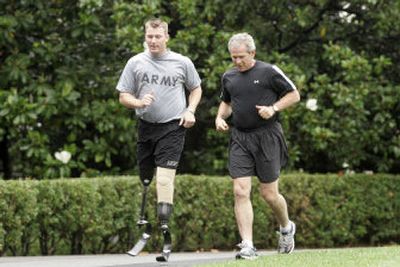President jogs with soldier who lost his legs in Iraq

WASHINGTON – One year and 14 surgeries after Army Staff Sgt. Christian Bagge lost both legs during a roadside bomb explosion in Iraq, he is out of a wheelchair and back on his feet – and jogging at the White House.
“He ran the president into the ground,” President Bush told reporters Tuesday as the two men took a break from a turn around the nearly quarter-mile track on the South Lawn.
They first met in January at Brooke Army Medical Center in San Antonio. Bagge was bedridden.
“He said, ‘I want to run with you,’ ” Bush said. “I looked at him, like, you know, there’s an optimistic person. But I could tell in his eyes that he meant it.”
Because Bagge cannot feel his feet hitting the ground, he has had to relearn the mechanics of jogging, relying on the energy return from carbon fibers in his prosthetic limbs, instead of his own calf and ankle muscles, to propel him forward.
“It’s very strange to get used to … you learn to feel the vibration of the prosthetic in your limb,” Bagge, 24, said in an interview the night before the presidential jog. “The prosthetic becomes an extension of you.”
His father, Doug, described his son as so agile that “many times, if you didn’t look down at his feet, you’d never know he doesn’t have them.”
Bagge, a member of an Oregon National Guard unit, and nine other soldiers were injured last June near Kirkuk.
He was trapped in the Humvee for about 45 minutes – well aware of his blood-soaked body, the left boot that was pointed in the wrong direction, and the pain. After being pulled from the vehicle, he waited another 45 minutes for a helicopter.
“At first I thought that I may have been dead because my driver wasn’t calling my name and he was calling other people’s names,” he said. “I thought maybe for a minute I was hearing things outside my body.”
Bagge’s right leg was amputated above the knee, his left leg below the knee. For many months, he said, he needed narcotics to get him through the severe phantom pain and post-surgical agony.
“To see him in the early days, having to scoot around on his bottom or falling out of his wheelchair – that was hard,” said Bagge’s father, who is a mission worker in Bolivia. “But he’s an overcomer.”
Bagge has four sets of limbs: one for walking, one for running, one for swimming and one as a backup. And he’s not ashamed of his injuries: When he was awarded a Purple Heart last year, Bagge wore shorts to the ceremony.
The hardest part of his recovery, he noted, has been mental.
“It can be very easy on certain days for me to get down and depressed,” he continued.
“But if I could ask an Iraqi who was oppressed by Saddam, ‘Hey, is this worth the loss of two legs of an American soldier?’ I think they would say yes.”